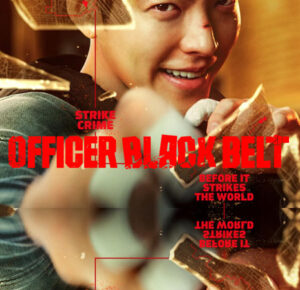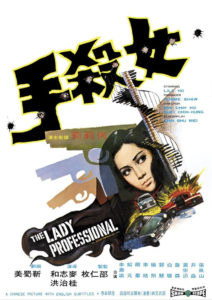
“Flag of Iron” American Theatrical Poster
Director: Chang Cheh
Cast: Philip Kwok, Chiang Sheng, Lung Tien Hsiang, Lu Feng, Wong Lik, Chui Tai Ping, Wong Ching Ho, Lam Chi Tai, Liang Yao Wen, Chan Shen, Skinny, Chan Hon Kwong, Chan Shu Kei, Chiang Kam, Chow Kin Ping, Fung King Man
Running Time: 108 min.
By Joe909
Flag of Iron is one of the better Venoms movies, with intricate choreography, colorful villains, fantastic sets, and excessive violence. I wish I could direct you to your nearest DVD retailer to pick it up, but unfortunately, until Celestial releases it, getting hold of this movie will require a lot of digging.
Now, you might see the NS DVD release of Flag of Iron at your local store, but that is not the version you want to buy. In fact, if you see the NS release, what you want to do is chuck it into the nearest dumpster, and then run like hell when security comes after you. Because that release, beyond being a bootleg itself, is cut into ribbons. The NS release runs 89 minutes. Flag of Iron, in its uncut state, runs 114 minutes. That’s nearly half an hour that’s been cut from the NS version!
Flag of Iron is similar to another Venoms movie, Masked Avengers, in that both are heavy on plot, both lack main Venoms Lo Meng and Sun Chien, and both are impressively violent. Of the two, I think Masked Avengers is the superior movie (not to mention the more gory), but Flag of Iron should rank high on any Shaw Brothers fan’s watch list. But like I said, be sure to hunt down a copy of the uncut version, which thankfully was released on video in Europe under the title The Spearman. Otherwise all we’d have would be the chopped-up NS release, which deletes major plot points, cuts off dialog even when characters are in the middle of a sentence, and tones down the violence.
The story concerns the virtuous Iron Flag clan, which is headed by a respectable, elderly leader who likes to keep the city clean. Lo (Kuo Choi) and Yuen (Chiang Sheng) are two of the top brothers, and we meet them as they bust a prostitution ring that’s run by a rival gang, the Eagle Clan. The Eagles are the Iron Flag’s sworn enemies, and Lo suspects a gang war is soon to erupt. After busting their operation, the Iron Flag leaders are shocked to receive an invitation to join the Eagle Can for dinner, to discuss peace between the gangs. They all suspect a trap, and Chow (Lu Feng), the eldest member of the Iron Flag clan, reveals that he’s hired an assassin who goes by the name Spearman (Tien Sheng Lung) to protect them.
Of course, it’s a trap, and all hell breaks loose in the restaurant. The unarmed Iron Flag leaders are surrounded by dozens of Eagle Clan fighters, but the Spearman arrives just in time to toss them small, spear-tipped weapons to fight with. But by the end of the fight, both the Iron Flag and Eagle Clan leaders are dead, and the remaining Eagle Clan fighters have escaped. Chow is elected to be the new Iron Flag leader. It’s decided that Lo should take the blame for everything, as the police inform them that the Eagle Clan is pressing charges, for the murder of their leader. Lo agrees to leave town for about a year, only to come back when things settle down. Chow promises to send him money once he gets settled.
Big surprise: the money never arrives, and Lo spends the next year working as an anonymous waiter in a restaurant. Things get worse when he’s attacked out of the blue by a guy with a large axe. Chang Cheh works in some dark comedy here, as Lo takes on the dude superhero style, fighting him while making sure no one notices, so his cover isn’t blown. And then when he kills the guy, he drops the corpse into the restaurant’s water well. How sanitary! Yuen shows up, reveals he’s been kicked out of the clan, and tells Lo that Chow has made the clan even more crooked than the Eagle Clan ever was. Prostitution, gambling, the works. Yuen also tells Lo that the dreaded 10 Killers, a group of mysterious assassins, are out for him, and they’ve been sent by Chow. Lo sends Yuen off to think things over.
Here the film enters its best part, as Lo takes on each of the 10 Killers. The fights here aren’t as long and drawn out as they are in most Venoms movies, but each features flawless choreography, outrageous weapons (one of the Killers uses an abacus), great use of the marvelous sets (I especially enjoyed the image of Kuo Choi jumping up on a rooftop, where he hopped around as the tiles slid out from beneath his feet) and some good old Chang Cheh bloodshed. This sequence is similar to another Shaws movie, Sun Chung’s 1978 Avenging Eagle, in which a gang of colorful assassins pursue Ti Lung and Fu Sheng. But whereas those assassins all seem like a bunch of comic book characters, the Killers in Flag of Iron are more the type who blend into their surroundings.
After defeating the Killers, Lo and Yuen head back to confront Chow. But instead of engaging in an immediate fight, they bide their time. Lo discovers that Chow is attempting to bribe him into rejoining the clan; making his underlings lose to Lo in high-stakes gambling matches. In the midst of this, the Spearman returns. He informs Lo that he is the man who killed the Iron Flag clan leader. He only did so because he was tricked into it by the despicable Chow, who wanted to take control of both clans. The Spearman insists that he wouldn’t kill a good man, and so wishes to join Lo and Yuen in their revenge.
The film takes its time getting to said revenge, with Lo, Yuen, and the Spearman conspiring against Chow. At one point Lo gets caught, and in a memorable scene he’s strung up in a leather cobweb that’s been soaked in water. As it dries, it gets tighter, crushing him to death. Soaked in blood, Lo looks to be done for, until he’s saved by an Iron Flag member who’s still virtuous. Finally the stage is set for the final showdown, as Lo, Yuen, and the Spearman take on Chow and his deadly flag.
The movie isn’t as fight-filled as you might expect. It’s more of a plot-driven story, with a focus on Kuo Choi’s character Lo. In fact, it seems like it takes forever to get to the final showdown. Chiang Sheng in particular doesn’t do much in this movie, even in the finale. He spends most of it off-camera, only to arrive to aid Kuo Choi for a few moments. It’s Kuo Choi who sees the most action in this film, and is its main star. Chiang Sheng is in total sidekick mode, and only gets to show his comedic talents in the first few minutes. Lu Feng is the same rotten bastard as always, but he only gets in two fights in the film. Regardless, all of the Venoms look pretty cool in the black and red garb the Iron Flag clan wears.
The movie features all manner of weaponry, and those fearing that it’s full of a bunch of guys just waving flags at each other are in for a surprise. The flags aren’t broken out until the end, and in fact they give us the film’s best gory scene, as one of them is hurled all the way through someone. The flag flies through the dude and embeds itself in a wooden beam, drenched in blood. More gore is sprinkled about the movie, and each of the 10 Killers gets wasted in creatively bloody ways.
One thing that brings this movie down is that Lo Meng, the muscle-bound Venom, is missing. I don’t know what it was with Lo Meng, but he had a tendency to not appear in the occasional Venoms movie. He would have been ideal to play the Spearman in Flag of Iron, but I guess he was too busy working out in the Shaw Brothers gym or something. It didn’t matter anyway, because it was around this time that Lo left the Venoms stable. I guess he got sick of always being the mark in Chang Cheh’s movies.
Joe909’s Rating: 9/10
























Be the 1st to Comment